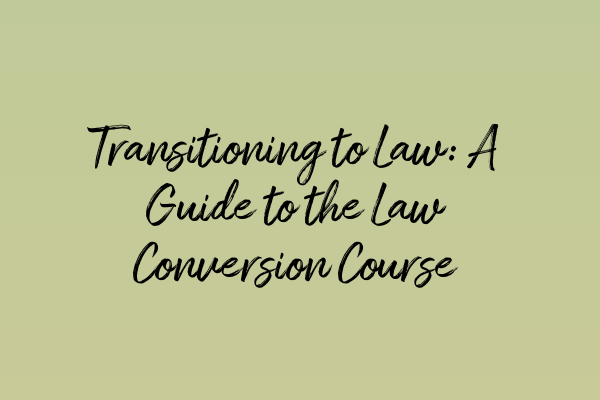Transitioning to Law: A Guide to the Law Conversion Course
Are you considering a career change to law? Perhaps you have already completed a non-law undergraduate degree and are now looking to pursue a legal profession. In order to accomplish this, you will need to undertake a Law Conversion Course, also known as the Graduate Diploma in Law (GDL). In this guide, we will walk you through everything you need to know about transitioning to law and successfully completing the Law Conversion Course.
1. What is the Law Conversion Course?
The Law Conversion Course is a postgraduate program designed for individuals who hold a degree in a non-law subject and wish to qualify as a solicitor or barrister. It provides you with the foundational legal knowledge and skills required to progress in the legal profession.
During the course, you will study core areas of law such as contract law, criminal law, constitutional law, and more. Additionally, you will develop essential legal research and writing skills, which are invaluable in the practice of law.
Upon successful completion of the Law Conversion Course, you will be eligible to progress to the next stage of legal training, such as the Legal Practice Course (LPC) for aspiring solicitors or the Bar Professional Training Course (BPTC) for aspiring barristers.
2. Entry Requirements
The entry requirements for the Law Conversion Course typically include a minimum of a 2:2 undergraduate degree in any subject. However, each university may have its own specific requirements, so it is important to check with the institutions you are interested in applying to.
Additionally, it is worth noting that competition for places on the Law Conversion Course can be fierce. Therefore, it is advantageous to have a strong academic record and relevant work experience in the legal field.
3. Duration of the Course
The Law Conversion Course is typically a one-year full-time program, although some universities offer part-time options. The course is intensive and requires dedication and commitment to successfully complete all the required modules.
Throughout the course, you will attend lectures, seminars, and workshops to gain a comprehensive understanding of the law. You will also have the opportunity to network with legal professionals and participate in moot courts or mock trials to gain practical experience.
4. Course Structure
The Law Conversion Course is structured to cover all the core areas of law. This includes subjects such as criminal law, contract law, land law, equity and trusts, and more.
Modules are usually taught through a combination of lectures, seminars, and self-directed study. It is important to manage your time effectively and stay on top of coursework and recommended readings.
To succeed in this course, it is important to actively engage with the material and seek clarification from your tutors when needed. Take advantage of any additional resources or workshops offered by your university to enhance your understanding of the topics.
5. Assessments
Assessments in the Law Conversion Course can vary depending on the university. Common assessment methods include written examinations, coursework assignments, research projects, and oral presentations.
It is crucial to familiarize yourself with the assessment criteria and requirements in order to effectively prepare and meet the expectations. Regular revision and practice of exam-style questions can significantly improve your chances of success.
6. Funding
Financing your Law Conversion Course can be a concern for many prospective students. Fortunately, there are various funding options available.
You may be eligible for scholarships, bursaries, or grants offered by the university or external organizations. Additionally, you can explore student loans and government funding options available for postgraduate study.
It is advisable to research and apply for financial assistance early in the application process to maximize your chances of securing funding.
7. Career Opportunities
After successfully completing the Law Conversion Course, you will have various career opportunities available to you.
If you wish to become a solicitor, you will need to progress to the next stage of legal training, such as the Legal Practice Course (LPC). The LPC equips you with the practical skills and knowledge required for a career in solicitor practice.
If you aspire to become a barrister, you will need to undertake the Bar Professional Training Course (BPTC). The BPTC focuses on developing your advocacy skills and preparing you for practice at the Bar.
Regardless of the path you choose, completing the Law Conversion Course is an essential step towards achieving your goal of becoming a qualified solicitor or barrister.
Conclusion
The Law Conversion Course provides a bridge for individuals with non-law backgrounds to enter the legal profession. It equips you with the necessary legal knowledge and skills to pursue a career as a solicitor or barrister.
Transitioning to law through the Law Conversion Course requires commitment, dedication, and hard work. It is important to stay organized, manage your time effectively, and seek support when needed.
If you are interested in learning more about specific areas of law, we invite you to explore our related articles:
- Private Prosecutions: Exploring Non-Governmental Prosecutions in Criminal Cases
- Understanding Drug-related Offences: Laws and Penalties in the UK
- Demystifying Criminal Law Procedures: A Step-by-Step Guide
- Rights of the Accused: Protecting Individual Liberties in Criminal Proceedings
- Magistrates’ Court vs Crown Court: Understanding Key Differences
We hope this guide has shed light on the process of transitioning to law through the Law Conversion Course. If you have any further questions or require assistance, do not hesitate to contact us at Become Solicitor SRA. We are here to support and guide you on your journey to becoming a solicitor or barrister.


Leave a Reply